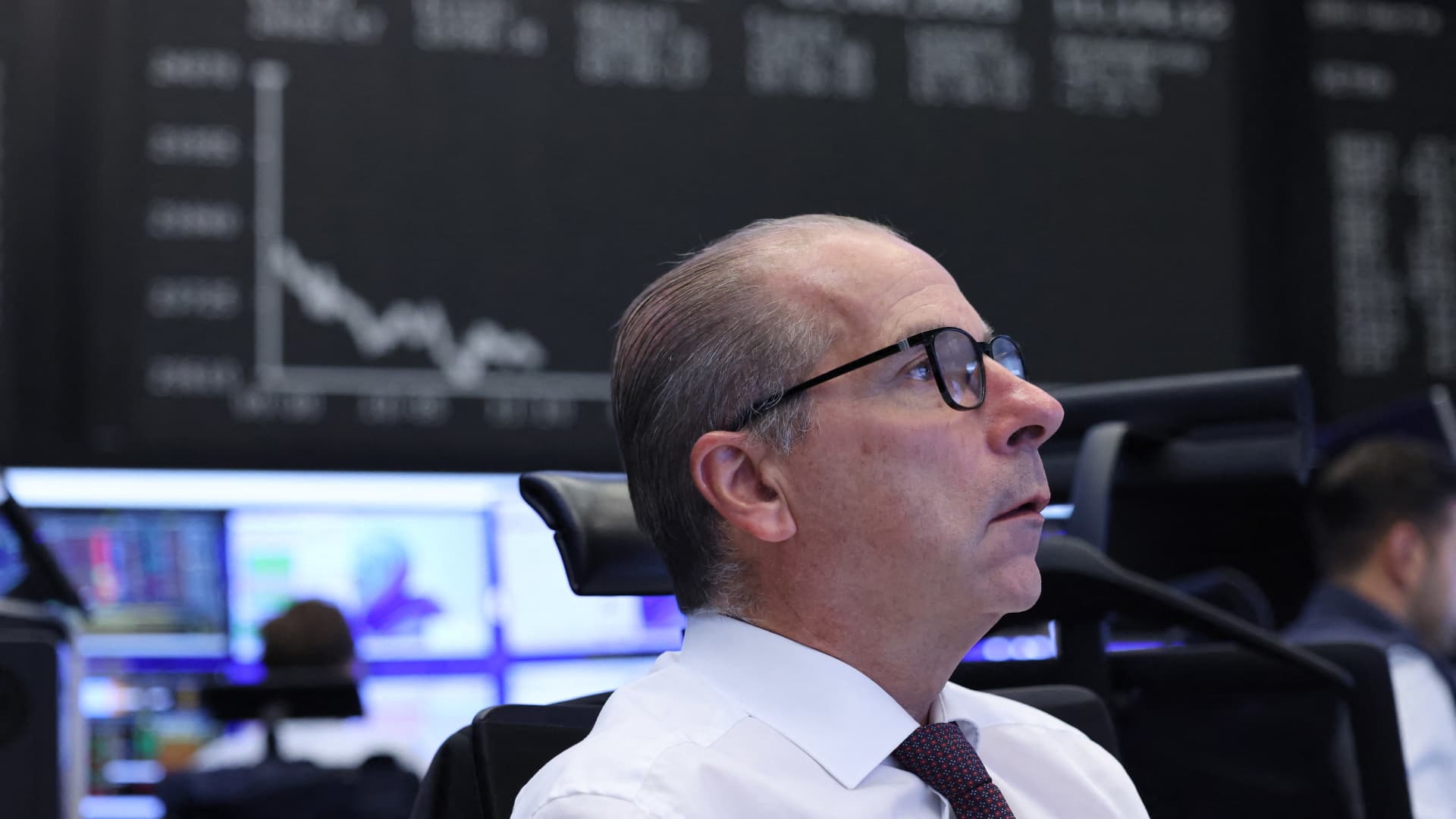European stocks close mixed
European stocks provisionally closed mixed, with the regional Stoxx 600 shedding 0.06%.
London’s FTSE 100 was nearly 0.4% higher, France’s CAC 40 was down 0.6%, and Germany’s DAX was almost 0.4% lower.
— Sawdah Bhaimiya
World’s largest sovereign wealth fund reduces investments in Israel
The world’s largest sovereign wealth fund, Norges Bank Investment Management, announced Monday, that it is reducing its investments in Israeli companies due to the “humanitarian crisis” in Gaza.
NBIM is reviewing its investments in Israeli companies at the request of Norway’s finance ministry. The fund was invested in 61 Israeli companies at the end of the first half of the year, of which 11 were not in the equity benchmark index of the ministry.
The bank said it decided, early last week, to sell all investments in Israeli companies that are not in the equity benchmark index, and to terminate contracts with external fund managers in Israel.
“We have spent the recent days selling all our investments in Israeli companies that are not in the equity benchmark index. We have now completely sold out of these positions,” it said in the press release. “The fund’s investments in Israel will now be limited to companies that are in the equity benchmark index. However, we will not be invested in all Israeli companies in the index.”
NBIM said it reached out to over 60 companies since 2020 to raise the issue, and 39 of them were related to the West Bank and Gaza.
“These measures were taken in response to extraordinary circumstances,” NBIM’s CEO Nicolai Tangen said. “The situation in Gaza is a serious humanitarian crisis. We are invested in companies that operate in a country at war, and conditions in the West Bank and Gaza have recently worsened.
“In response, we will further strengthen our due diligence. The measures we are taking will simplify the management of our investments in this market and reduce the number of companies that we and the Council on Ethics monitor,” Tangen added.
— Sawdah Bhaimiya
U.S. stocks are little changed to kick off new trading week
AI anxiety may be slowing hiring in the U.S. labor market: Citi’s Baldwin

Lucy Baldwin, Citi’s global head of research, said the tech industry is facing weaker hiring than most other sectors and AI may be playing a role.
“I think it’s far too early in very broad terms to say that labor market weakness is to do with the AI trade, but it is interesting that certainly that’s where you see higher unemployment rates in some of the younger groups of the labor market in that tech sector,” Baldwin told CNBC’s “Squawk Box Europe.”
“The labor market overall is a bit softer, but is it because companies are thinking ‘Well AI is just around the corner.’ More of these jobs can be automated through the use of different types of generative AI.”
Baldwin noted that repetitive and administrative jobs are the ones that are likely to be automated by AI.
— Sawdah Bhaimiya
Orsted shares plunge
The Orsted Block Island Wind Farm in this aerial photograph taken above the water off Block Island, Rhode Island.
Eric Thayer | Bloomberg | Getty Images
Orsted shares crashed more than 25% on Monday morning, after the wind farm developer said it plans a 60 billion Danish kroner ($9.4 billion) rights issue, following a “material adverse development” in the U.S. market.
The company said this turn of events left it unable to raise funds from a planned partial divestment of its Sunrise Wind project off the coast of New York.
Read more here.
— Chloe Taylor
European stocks open higher
European shares moved higher at this morning’s open. The pan-European Stoxx 600 was last seen up by 0.3%, with most sectors in positive territory.
London’s FTSE 100, up 0.3%, is leading gains among major regional bourses.
— Chloe Taylor
Earnings roundup
We’re coming to the end of Europe’s corporate earnings season — here’s what we’ve learned so far.
Research by Deutsche Bank shows full-year earnings estimates are down 10% since the final quarter of 2024. That being said, when it comes to guidance updates, the lender points out that more companies raised, rather than lowered, their guidance for the second quarter.
More than a quarter of firms upgraded their guidance in the most recent quarter, with only 17% downgrading their outlooks.
Those firms that have downgraded their guidance are focused in the chemicals and autos sectors, with tariffs and forex headwinds cited as the key driver of those cuts. Looking ahead, Deutsche Bank sees more reason for optimism, saying the trade deal between the EU and the U.S. provides more visibility, and that it expects firms to hike the lower end of their guidance.
— Jordan Butt
U.S.-China tariffs deadline looms
Chinese President Xi Jinping and U.S. President Donald Trump.
Dan Kitwoodnicholas Kamm | Afp | Getty Images
The end of the three-month trade truce between the U.S. and China is imminent.
Back in May, delegates from Washington and Beijing agreed on a deal that would suspend most tariffs for 90 days. Under the agreement, so-called “reciprocal” tariffs between the two countries were cut from 125% to 10%, with the U.S. also keeping its 20% duties relating to fentanyl imports in effect.
Investors are awaiting news on what’s next for the fraught trading relationship.
Asia-Pacific shares were muted on Monday with the impending tariff deadline influencing sentiment.
Read CNBC’s latest coverage on the U.S.-China deal.
— Chloe Taylor
Here are your opening calls
Good morning from London and welcome to another week of live news on what’s moving European markets.
Regional shares look set to rise slightly at today’s open. Futures tied to the DAX and the CAC 40 were last seen trading 0.17 and 0.15% higher, respectively. Those tied to London’s FTSE 100 are currently hovering just above the flatline.
— Chloe Taylor
